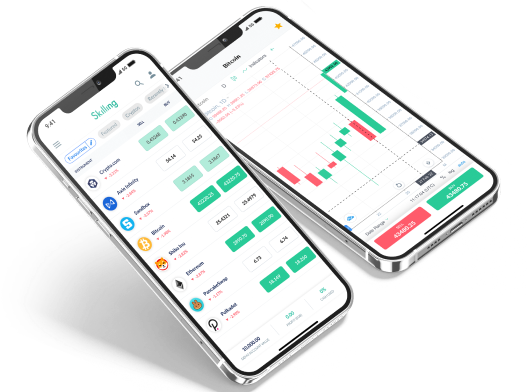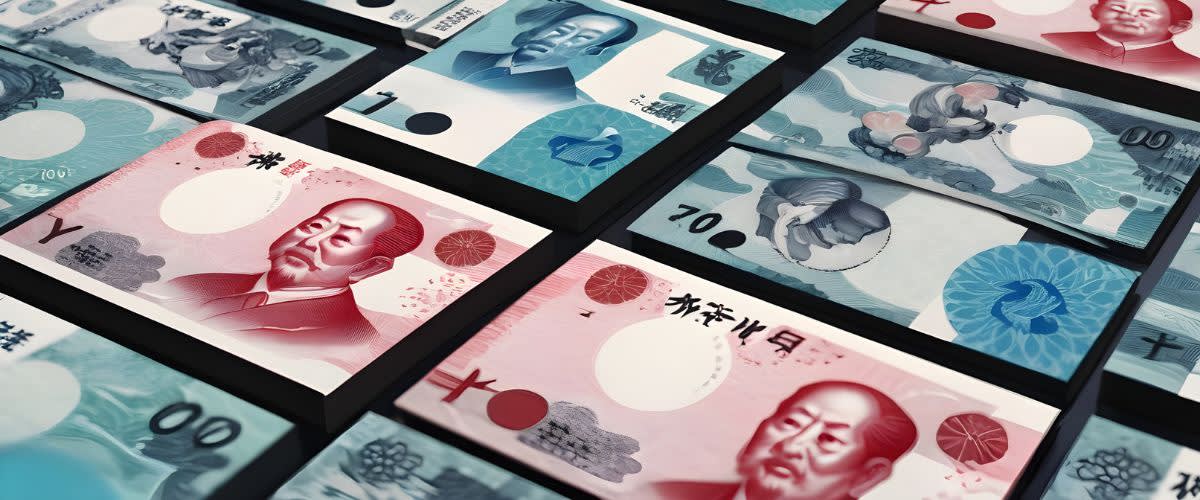The Japanese yen continues to play a pivotal role in the global financial landscape. Known for its stability and reliability, the yen is not just Japan's official currency but also a key player in the world's Forex markets.
History of Japanese currency Japanese currency, a brief history
The yen's journey, dating back to the 8th century, mirrors Japan's rich history. Initially adopting Chinese coins, Japan later developed its currency, the wadōkaichin. The 17th century saw the introduction of Japan's first paper currency, hansatsu, marking a significant evolution in its monetary system. In 1871, the yen was officially adopted, initially pegged to gold, a standard that was later abandoned. Post-World War II, Japan's economic resurgence propelled the yen to become one of the most traded currencies globally.
The yen remains a popular currency in the foreign exchange market due to its liquidity and volatility. Despite being undervalued, it is still widely traded by Forex investors who seek to profit from its fluctuations. The Bank of Japan, Japan's central bank, is responsible for issuing and regulating this currency.
The history of Japanese money is a rich and varied one, with many fascinating developments over the centuries. From ancient Chinese coins to modern-day Forex trading, the yen has played a vital role in Japan's economic growth and remains an essential currency in the global financial markets.
Experience Skilling's award-winning platform
Try out any of Skilling’s trading platforms on the device of your choice across web, android or iOS.

The yen in global Forex markets
The Japanese yen holds a prominent position in the global forex markets, characterized by its unique attributes and the role it plays in international finance:
- Major currency: The yen is one of the most traded currencies in the world, ranking behind only the U.S. dollar and the euro in terms of trading volume. Its significance is a reflection of Japan's economic stature as the third-largest national economy and its extensive global trade networks.
- Safe-haven status: The yen is widely regarded as a safe-haven currency. In times of geopolitical tension, economic uncertainty, or market volatility, investors often turn to the yen as a store of value. This flight to safety can lead to an appreciation of the yen, even in the face of domestic economic challenges.
- Interest rate differential: Japan has historically maintained low interest rates, especially when compared to other major economies. This interest rate differential makes the yen a popular choice for carry trades, where investors borrow yen at low-interest rates to invest in higher-yielding assets elsewhere. While profitable, this strategy introduces vulnerability to sudden shifts in risk sentiment or interest rate changes.
- Impact of BoJ policies: The Bank of Japan's monetary policy significantly influences the yen's value on the forex market. Interventions, whether through quantitative easing or direct market actions to curb yen strength, are closely watched by traders for their immediate and long-term effects on currency valuation.
- Global economic indicators: The yen's value is also sensitive to changes in global economic indicators, such as U.S. economic data, Chinese economic performance, and shifts in commodity prices. As Japan is a major importer of energy and raw materials, global commodity price fluctuations can impact its trade balance and, by extension, the yen's value.
- Liquidity and volatility: The yen's liquidity, ensured by the depth and breadth of the Japanese economy, makes it an attractive currency for forex trading. It offers opportunities for profit from both its volatility in response to global events and more predictable trends influenced by economic cycles and policy decisions.
Factors affecting the yen's value
- Economic policies: Japan's monetary policy, set by the Bank of Japan (BoJ), plays a crucial role. Measures such as interest rate adjustments, quantitative easing, and currency intervention can significantly impact the yen's strength. For instance, lower interest rates or increased money supply typically weaken the yen, making Japanese exports more competitive.
- Trade balance: Japan's status as a major exporter means that its trade balance (the difference between its export and import values) is a key determinant of the yen's value. A trade surplus often leads to a stronger yen, as foreign buyers need to purchase yen to pay for Japanese goods.
- Global market sentiment: The yen is considered a "safe-haven" currency, meaning it tends to appreciate during times of global financial uncertainty or market volatility. Investors flock to the yen during crises, seeking stability, which drives up its value.
- Economic indicators: Key indicators such as GDP growth, inflation rates, and unemployment figures can influence investor perceptions of Japan's economic health and, by extension, the yen's attractiveness. For example, higher inflation could lead to expectations of tighter monetary policy, potentially strengthening the yen.
- Geopolitical events: Political events within Japan and its major trading partners can affect the yen. Political stability, election outcomes, and changes in government policies regarding trade and investment can sway investor confidence and currency valuation.
- International relations: Japan's economic and diplomatic relations with other countries, especially the United States and China, can impact the yen. Trade agreements, tariffs, and geopolitical tensions are all factors that traders monitor closely.
- Market speculation: The forex market's speculative activity can also drive the yen's value. Large currency positions taken by institutional investors based on expectations of future events can lead to significant short-term movements.
Significant historical events impacting the yen
The Japanese yen has a long and complex history that has been influenced by various political, economic, and social events. The global financial crisis of 2008, the rise of China as an economic power, and the COVID-19 pandemic have had varying impacts, depending on the specific economic conditions and policies in place at the time.
Here are some more events which have had a significant impact on the value of the yen, and the Japanese economy.
- The Plaza Accord of 1985: This agreement among major economies led to a rapid appreciation of the yen, impacting Japan's export-driven economy.
- The Asian Financial Crisis of 1997: This crisis devalued the yen, leading to a recession and subsequent economic policies to revive the economy.
- The 2011 Earthquake and Tsunami: These disasters had profound effects on Japan's economy and the yen, prompting government intervention.
- The COVID-19 Pandemic (Starting in 2020): Caused unprecedented disruptions to global trade and economies. The pandemic led to a decline in demand for the yen as a haven initially, due to the uncertainty and economic downturn. The yen experienced volatility as Japan and the world navigated through the pandemic's economic implications, with ongoing effects into 2024.
The history of this currency has been shaped by various events that have had significant impacts on its value and the Japanese economy as a whole. Understanding them and their effects is essential for anyone looking to trade the yen or invest in the Japanese economy.
Trading the Japanese yen
Trading the Japanese yen offers a unique opportunity for investors due to Japan's significant role in the global economy and the yen's status as a major currency in the Forex market. Here's a deeper look into trading the yen:
- Forex trading: The yen is one of the most traded currencies in the world, offering liquidity and volatility that attract traders. Currency pairs involving the yen, such as USD/JPY, EUR/JPY, and GBP/JPY, are popular choices. Traders leverage these pairs to speculate on changes in Japan's economy, interest rate differentials, and broader geopolitical events.
Exchange-traded funds (ETFs): For those looking to gain exposure to the Japanese economy without directly trading currency pairs, yen-denominated ETFs provide an alternative. These funds may track indices of Japanese stocks or bonds, offering a diversified investment that still captures the yen's movements. white text for space
Futures and options: The yen is also available for trading via futures and options on various exchanges. These derivative products allow traders to hedge against currency risk or speculate on future movements of the yen. Futures contracts obligate the purchase or sale of the yen at a predetermined price on a specific date, while options give the right, but not the obligation, to buy or sell at a set price. white text for space
Carry trade: The yen has historically been a favorite for carry traders, who borrow in currencies with low-interest rates (like the yen) to invest in currencies with higher returns. This strategy, however, requires a keen understanding of interest rate movements and risk management to navigate the potential volatility.
Summary
For Forex traders, understanding the yen's behavior involves monitoring Japan's economic indicators, global market sentiment, and geopolitical developments. Successful trading strategies often combine technical analysis of yen price movements with fundamental analysis of factors likely to influence its value.
The yen's role as a cornerstone of the global economy and a key currency in Forex trading remains unchallenged in 2024. Its understanding is essential for traders looking to capitalize on the opportunities it presents.
Ready to dive into yen trading? Sign up with Skilling today and access advanced trading platforms and resources designed for enhanced trading experience in the Forex market.












